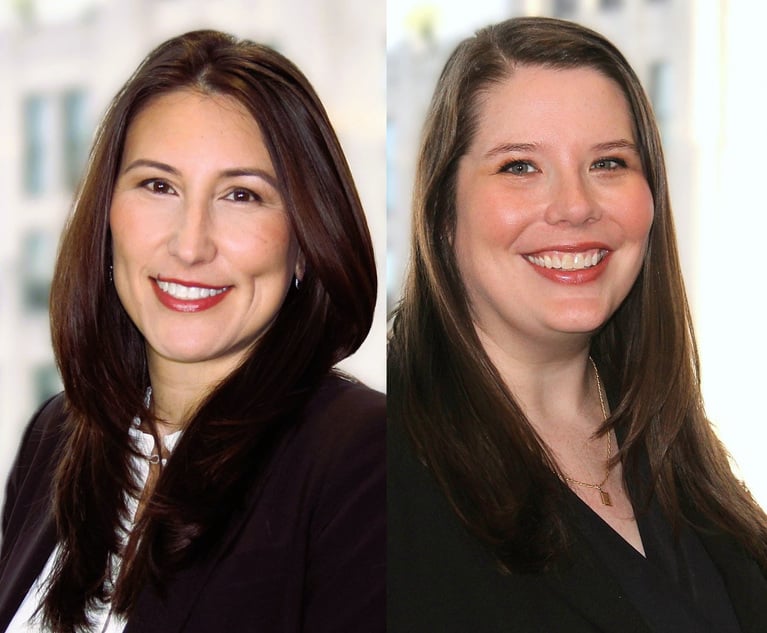Climbing the Financial Ladder: Women GCs Transform the Legal Landscape
The pay gap is smaller at managing counsel and senior counsel levels—where women receive 90 percent and 89 percent of their male colleagues' compensation, respectively.
August 29, 2018 at 03:20 PM
5 minute read
 (Photo: posteriori/Shutterstock.com)
(Photo: posteriori/Shutterstock.com)
Corporate Counsel's 2018 General Counsel Compensation Survey provides insight into trends and growth areas for the legal market as a whole. In addition to showing a rise in compensation for top lawyers in middle market companies and the dominance of the finance and entertainment industries, the survey also highlights another issue across the legal industry—fewer women in high-level roles and a persistent pay gap. However, the raw numbers belie some positive trends as women progress through the corporate legal ranks.
Among the 100 most highly compensated GCs surveyed by Corporate Counsel, 23 are women. The Top 10 for 2018 has only one—Laureen Seeger of American Express. In addition, executive search firm BarkerGilmore's 2018 In-House Counsel Compensation Report showed that women GCs make about 78 percent of the average total compensation that their male counterparts receive.
But there are signs of change. The pay gap is smaller at managing counsel and senior counsel levels—where women receive 90 percent and 89 percent of their male colleagues' compensation, respectively. And BarkerGilmore notes that annual salaries are increasing at a higher rate for female GCs.
Although the process is slow, the pay gap will likely continue decreasing as more women rise through the ranks as both in-house and law firm attorneys. Considering that between 1947 and 2018 the percentages of female law school students increased from 3.3 percent to 48.7 percent, there is no reason to believe this forward progress will not continue.
In addition, the women topping the ranks of Corporate Counsel's survey in recent years are standout. One departing female GC—Denise Keane, who retired in 2017 after 40 years with Altria Group Inc.—received a hefty retirement package that has been cited as an explanation for why the average total cash compensation for the 100 highest-paid GCs decreased by 4.2 percent from 2017 to 2018.
Further, although Seeger is the only woman in the 2018 Top 10, she moved up a spot from last year to be second on the list with $6.7 million in compensation (just behind Morgan Stanley's Eric Grossman, with $6.9 million). Seeger oversees American Express' 200-lawyer legal department, comprised of 57 percent women.
Now that Seeger has reached the highest echelons of in-house attorneys, she is working hard to close the pay gap and support women and minorities. In an interview with Corporate Counsel earlier this year, Seeger said she prioritizes diversity not only on her team, but also in the outside law firms she retains:
“When we've had a new case, if the firm wasn't diverse enough, we haven't selected them to represent us on that new matter. … The only way we'll know we've succeeded and other companies have succeeded is when we start seeing more women partners as a percentage and more people of color as a percentage in the law firms that we hire.”
And there may be more diverse firms to choose from than ever before. Diversity Lab recently released its first group of law firms certified under the Mansfield Rule. The Mansfield certification means law firms affirmatively considered women and lawyers of color—at least 30 percent of the candidate pool—for leadership and governance roles, equity partner promotions and senior lateral positions. Diversity Lab says the goal of the rule is to boost the representation of diverse lawyers in law firm leadership by broadening the pool of candidates considered for these opportunities. Forty-one firms earned Mansfield certification. Twenty-seven are certified as Mansfield “Plus,” which means at least 30 percent of leadership positions are now held by women and diverse attorneys.
And GCs are taking notice, said Diversity Lab's Lisa Kirby. “It seems like every few weeks we hear of another legal department that has started asking outside counsel in their RFPs whether they are participating in the Mansfield Rule or are Mansfield Certified,” Kirby said via email. “Some GCs have even told their firms that they must become Mansfield Certified or lose their spot as preferred providers. I think GCs see participation in the Mansfield Rule as a way to help identify firms that are truly committed to taking action to improve their pipelines and broaden their thinking.”
Whether the law firm leaders become GCs or work for GCs, this measure could both increase opportunities for lawyers of all backgrounds and create a positive financial impact for law firms.
 Meredith Whigham Caiafa
Meredith Whigham CaiafaMeredith Whigham Caiafa is of counsel in Morris, Manning & Martin's Employment, Benefits & Executive Compensation practice group. This article is for informational purposes only and is not intended to constitute legal advice.
This content has been archived. It is available through our partners, LexisNexis® and Bloomberg Law.
To view this content, please continue to their sites.
Not a Lexis Subscriber?
Subscribe Now
Not a Bloomberg Law Subscriber?
Subscribe Now
NOT FOR REPRINT
© 2025 ALM Global, LLC, All Rights Reserved. Request academic re-use from www.copyright.com. All other uses, submit a request to [email protected]. For more information visit Asset & Logo Licensing.
You Might Like
View All

CFPB Proposes Rule to Regulate Data Brokers Selling Sensitive Information
5 minute read
Trending Stories
- 1Ticket-Fixing Scheme Results in Western NY Judge's Resignation—for a Second Time
- 2Legal Community Mourns the Loss of Trailblazing Judge Dorothy Chin Brandt
- 3Delaware Supreme Court, Reversing Chancery, Lowers Review Standard for TripAdvisor Move to Nevada
- 4Haynes and Boone Expands in New York With 7-Lawyer Seward & Kissel Fund Finance, Securitization Team
- 5Upstart Insurer That's Wowing Industry Hires AIG Legal Exec to Help Guide Global Expansion
Who Got The Work
J. Brugh Lower of Gibbons has entered an appearance for industrial equipment supplier Devco Corporation in a pending trademark infringement lawsuit. The suit, accusing the defendant of selling knock-off Graco products, was filed Dec. 18 in New Jersey District Court by Rivkin Radler on behalf of Graco Inc. and Graco Minnesota. The case, assigned to U.S. District Judge Zahid N. Quraishi, is 3:24-cv-11294, Graco Inc. et al v. Devco Corporation.
Who Got The Work
Rebecca Maller-Stein and Kent A. Yalowitz of Arnold & Porter Kaye Scholer have entered their appearances for Hanaco Venture Capital and its executives, Lior Prosor and David Frankel, in a pending securities lawsuit. The action, filed on Dec. 24 in New York Southern District Court by Zell, Aron & Co. on behalf of Goldeneye Advisors, accuses the defendants of negligently and fraudulently managing the plaintiff's $1 million investment. The case, assigned to U.S. District Judge Vernon S. Broderick, is 1:24-cv-09918, Goldeneye Advisors, LLC v. Hanaco Venture Capital, Ltd. et al.
Who Got The Work
Attorneys from A&O Shearman has stepped in as defense counsel for Toronto-Dominion Bank and other defendants in a pending securities class action. The suit, filed Dec. 11 in New York Southern District Court by Bleichmar Fonti & Auld, accuses the defendants of concealing the bank's 'pervasive' deficiencies in regards to its compliance with the Bank Secrecy Act and the quality of its anti-money laundering controls. The case, assigned to U.S. District Judge Arun Subramanian, is 1:24-cv-09445, Gonzalez v. The Toronto-Dominion Bank et al.
Who Got The Work
Crown Castle International, a Pennsylvania company providing shared communications infrastructure, has turned to Luke D. Wolf of Gordon Rees Scully Mansukhani to fend off a pending breach-of-contract lawsuit. The court action, filed Nov. 25 in Michigan Eastern District Court by Hooper Hathaway PC on behalf of The Town Residences LLC, accuses Crown Castle of failing to transfer approximately $30,000 in utility payments from T-Mobile in breach of a roof-top lease and assignment agreement. The case, assigned to U.S. District Judge Susan K. Declercq, is 2:24-cv-13131, The Town Residences LLC v. T-Mobile US, Inc. et al.
Who Got The Work
Wilfred P. Coronato and Daniel M. Schwartz of McCarter & English have stepped in as defense counsel to Electrolux Home Products Inc. in a pending product liability lawsuit. The court action, filed Nov. 26 in New York Eastern District Court by Poulos Lopiccolo PC and Nagel Rice LLP on behalf of David Stern, alleges that the defendant's refrigerators’ drawers and shelving repeatedly break and fall apart within months after purchase. The case, assigned to U.S. District Judge Joan M. Azrack, is 2:24-cv-08204, Stern v. Electrolux Home Products, Inc.
Featured Firms
Law Offices of Gary Martin Hays & Associates, P.C.
(470) 294-1674
Law Offices of Mark E. Salomone
(857) 444-6468
Smith & Hassler
(713) 739-1250







